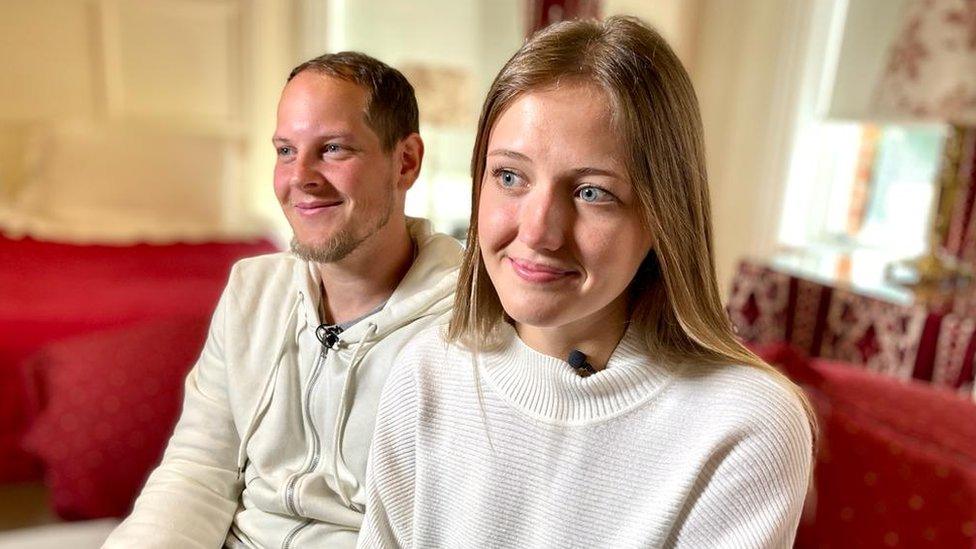Ukrainians in NI: 'This war has changed my life completely'
- Published
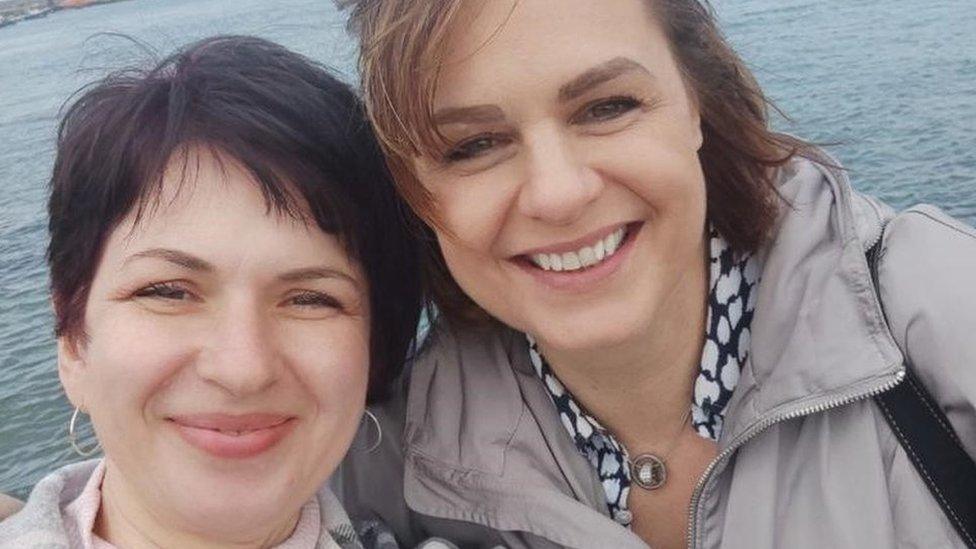
Nadia Yatshenko (left) with her County Down sponsor and host Jacki Urey
"When I came to Northern Ireland firstly I was happy, because this place is very calm and peaceful."
Nadia Yatshenko is among more than 2,100 Ukrainians who have sought refuge in Northern Ireland since Russia's full-scale invasion of Ukraine began a year ago.
The 49-year-old has swapped the chaos in her home city of Kharkiv for the safety of east Belfast.
But she is now here alone, because the family members she travelled with were so homesick in Northern Ireland they returned to the warzone.
"When we left Ukraine the situation in Kharkiv was very, very horrible, because it was bombing every day and every night," Nadia recalls.
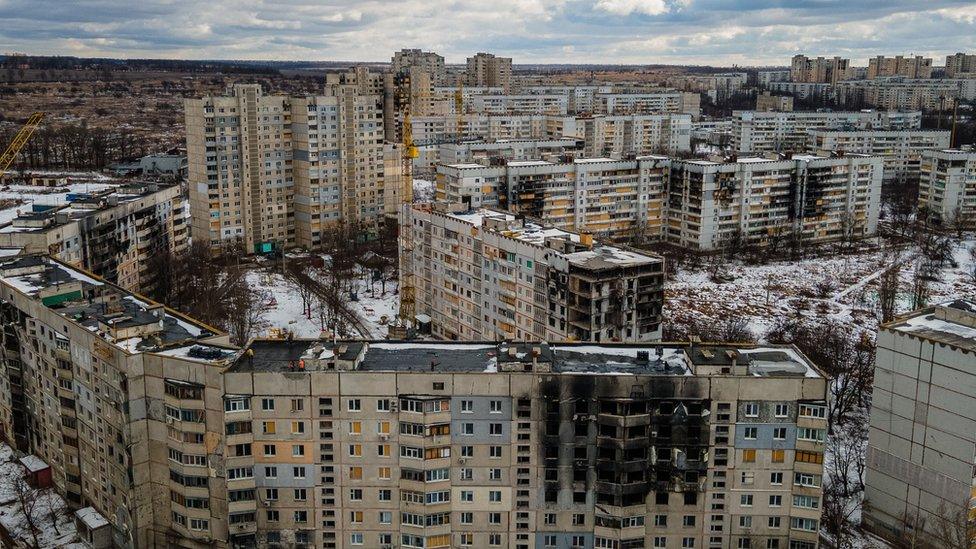
An aerial view of residential buildings damaged by shelling in Kharkiv on 20 February, 2023
She spent the first 10 days of the war sheltering in a corridor from constant explosions.
On 6 March, she decided to flee her homeland with her 19-year-old daughter and her own elder sister.
The three women applied to the UK-wide Homes for Ukraine scheme, external and found a Northern Ireland sponsor through Facebook.
They arrived in April and for the first few months, they stayed in their host's family home in the County Down village of Darragh Cross.
Despite the warm welcome they received, it was challenging to be so far from home.
"You don't just leave [your] house, you leave part of your life behind," Nadia explains.
"You don't know when you come back and you don't know anything about the future."
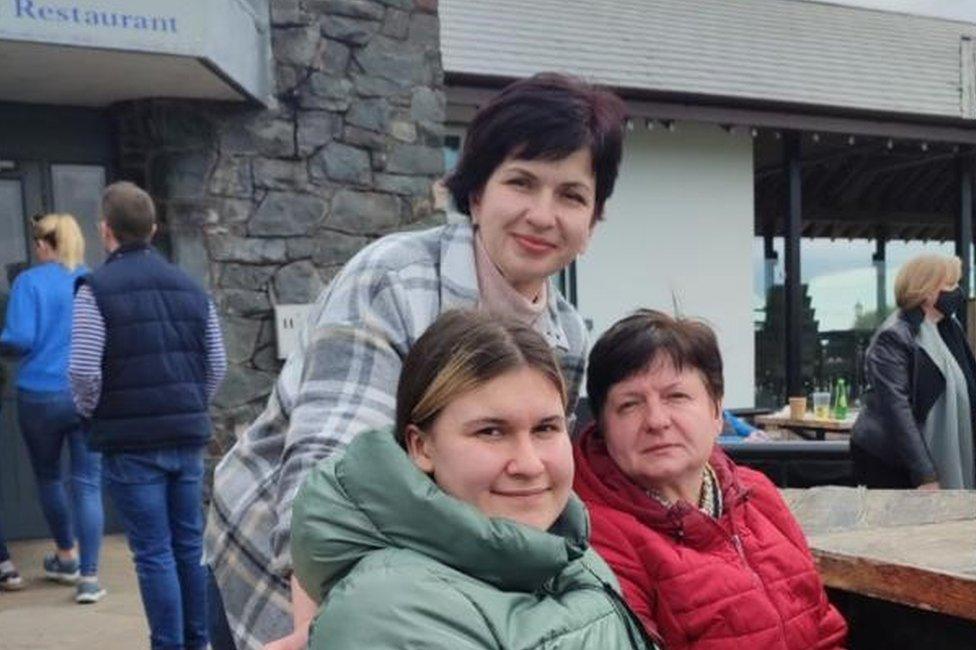
Nadia fled to Northern Ireland with her daughter and sister
This time last year, Nadia had a home of her own and an office job in Kharkiv National Medical University.
She also had experience working as a children's English language tutor.
But when she got to Northern Ireland, she could barely understand a word people were saying, thanks to the unfamiliar accent.
"The local people were very kind to me and I started working very quickly," she said.
She took a job as a restaurant kitchen assistant, preparing desserts, but despite swotting up on culinary vocabulary, much was lost in translation.
"When I came to the kitchen and the chef started talking to me I couldn't understand him because the food is different," she said.
"In Ukraine we don't have custard, apple crumble and so on. It is not our food."
'I am worried about them'
Nadia gradually adapted to local accents and tastes, but the rest of her family struggled to settle.
"They don't speak English at all, so it is a problem... for my sister it was like a disaster because she can't express herself, she can't talk and it is really difficult," Nadia explained.
"She had a very good position in Ukraine, she was working at the university. She has a very good house and in one day, everything changed."
Her sister was so upset that in June she returned home to Kharkiv, along with Nadia's daughter.
"Of course I am worried about them. I call them every day to ask them about the situation, about electricity, about internet," Nadia said.
While the situation in Kharkiv was still "very scary", Nadia accepts her sister and daughter are adults who must make their own decisions.
'This year was awful'
Nadia decided to stay in Northern Ireland, but later moved to Belfast for better public transport services and more opportunities.
She is now living in the east of the city with a new sponsor. She got a job as a hotel cleaner and began attending Belfast Metropolitan College.
"I wanted to improve my English, I wanted to study, I wanted to look at the educational area again," she said.
"I'm trying to rent my own apartment and in this period I'm going to stay in Northern Ireland and keep trying to start my life here."
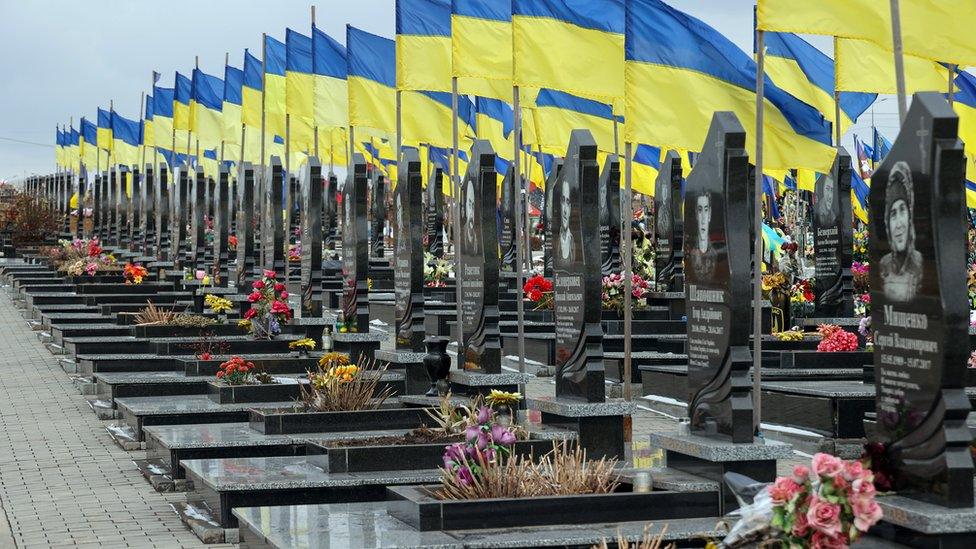
Thousands of Ukrainians have been killed in the war over the past year
But she admits it is not easy to begin again with nothing, shortly before your 50th birthday, against the backdrop of the continuing horror in her homeland.
"This war has changed my life completely," she said.
"I can't find the best words to express my mind but this year was awful because many people were killed... young people. It is not OK."
Much of the practical support for traumatised Ukrainian refugees in Northern Ireland started from the ground up - local volunteers stepping in to arrange accommodation and employment.
'They miss their own home'
Lorraine Ferguson from Carrickfergus, County Antrim, has spent a vast amount of the past year on Facebook, matching Ukrainian refugees with sponsor families.
She estimates she has helped more than 100 Ukrainian refugees to find accommodation in Northern Ireland.
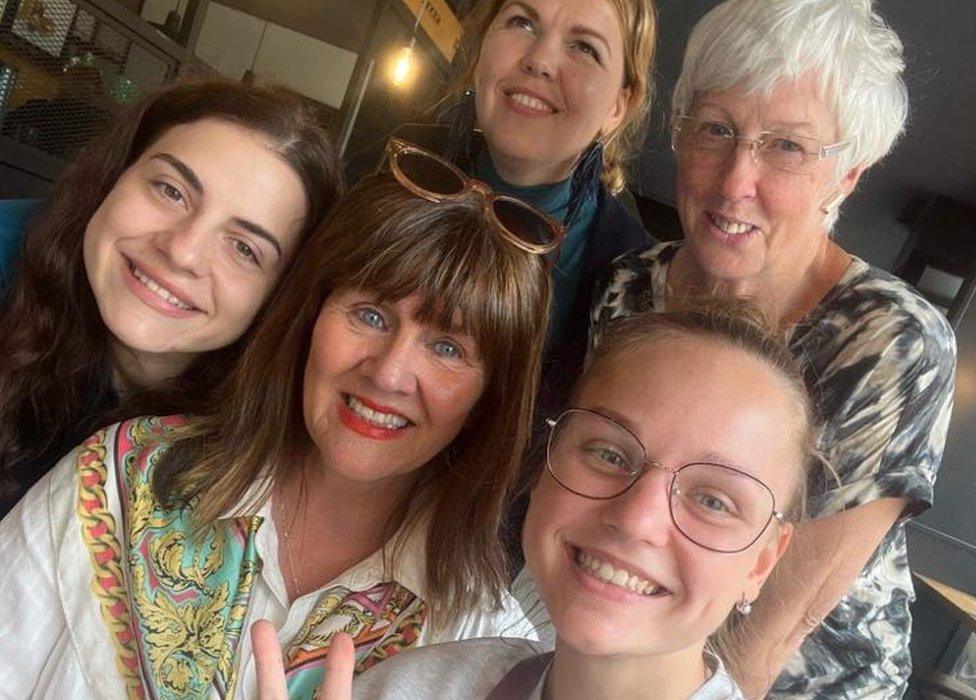
Lorraine Ferguson (centre) has matched hundreds of Ukrainians with NI host families
"When I saw it on the news, all those mothers and children fleeing Ukraine on those trains... I was really touched," she said.
"So I started trying to find out more. Where were they going?
"I'd heard about the Homes for Ukraine scheme, so I joined it."
But she felt it was taking much too long to connect willing hosts with people desperate to get to safety.
"Sponsors from here would be putting on Facebook: 'I have a room, I can take two' and I started noticing this.
"And I started noticing people from Ukraine posting on Facebook that they needed to get out and needed a sponsor."
Ms Ferguson and other volunteers began introducing those families to each other via social media and she has stayed in contact with many of those she assisted.
"There's hundreds of Ukrainians here with lovely sponsor families that are looking after them, and the kids are in school."
But she added: "Some Ukrainian mums are definitely finding it very, very difficult to be here on their own without their husbands - children playing up, missing their daddies."
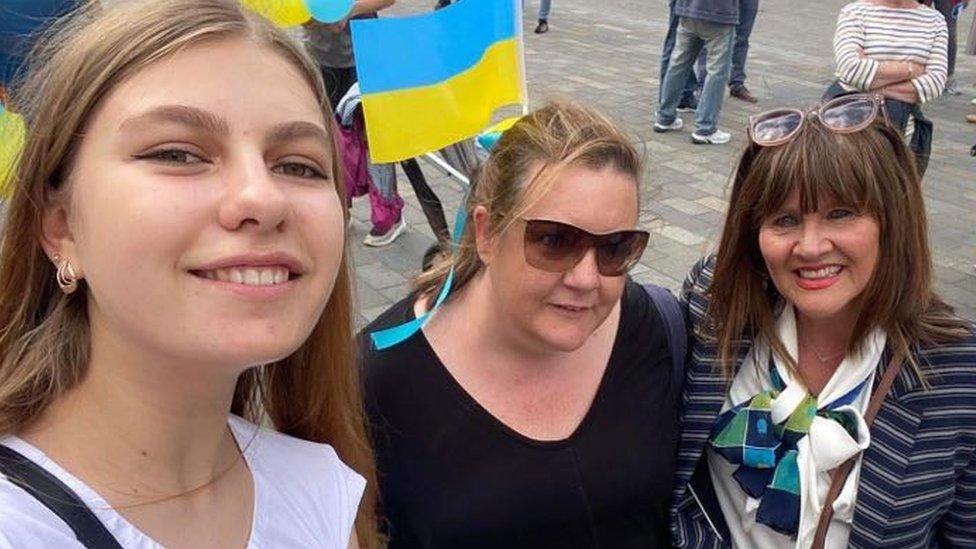
Lorraine Ferguson (right) says more hosts are needed to help people flee Ukraine
Ms Ferguson, a grandmother of five who works as an estate agent, said demand had eased since the early months of the war.
But she still regularly gets calls for help and said in her experience it is now taking much longer to get refugees into the UK.
"Yesterday alone I must have got six messages from mothers with children needing to get out of Ukraine because they're worried about what's going to happen on the first anniversary or within the next few weeks," she said.
"The problem is we don't have any sponsors here at the minute, we're very short of people to sponsor Ukrainians."
The refugees who have arrived in Northern Ireland so far were very appreciative of the support provided to them, said Ms Ferguson.
"They miss their own home and they miss their husbands and their dads, but apart from that they're just so glad and so grateful that they've been able to get to safety here."
- Published24 February 2023
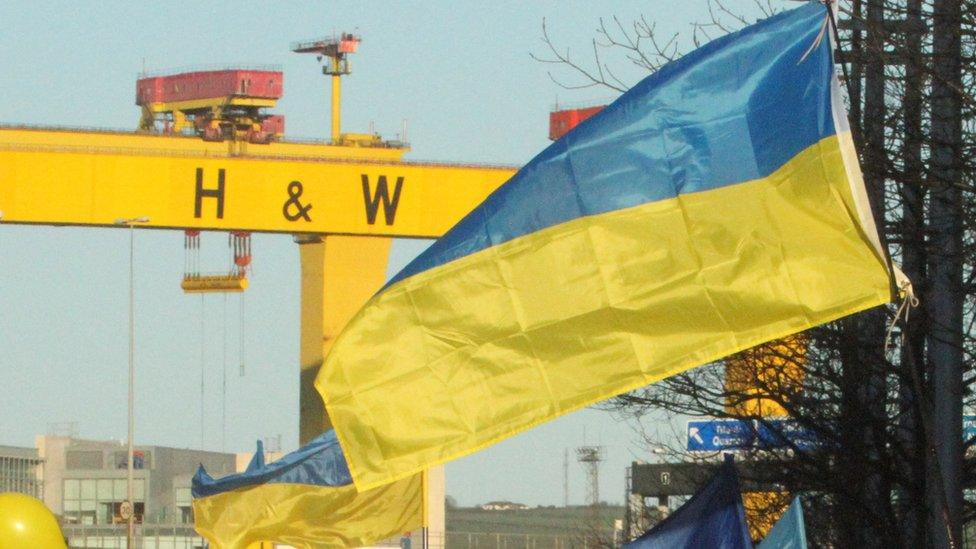
- Published28 December 2022
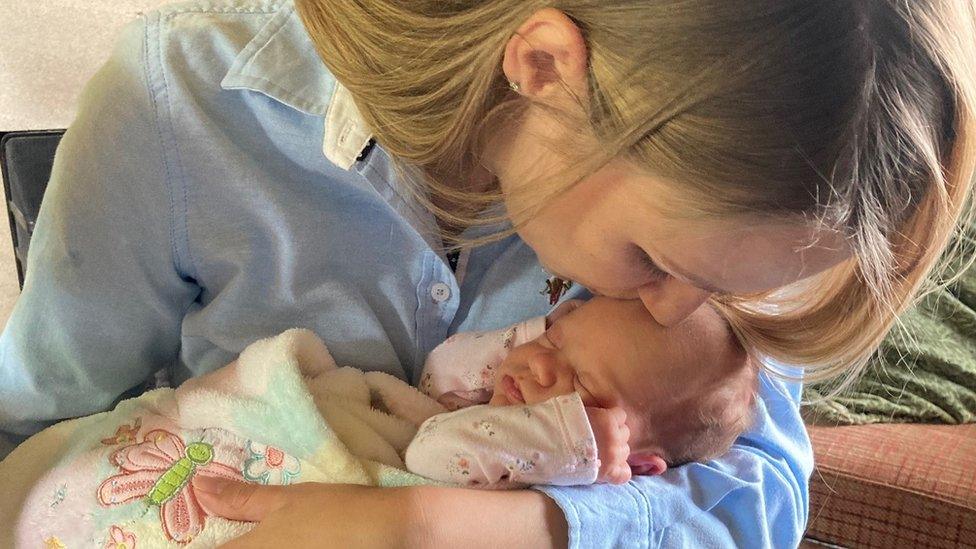
- Published23 December 2022
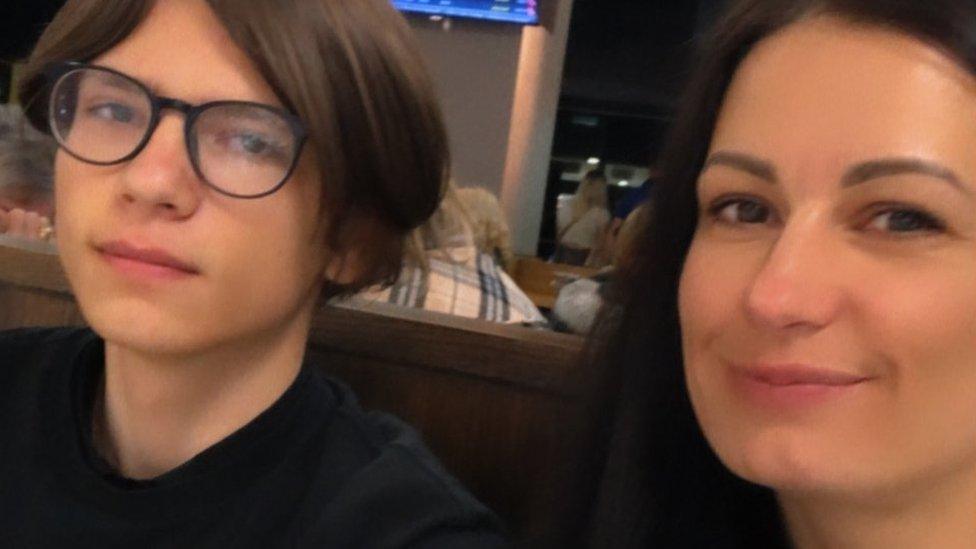
- Published10 November 2022
